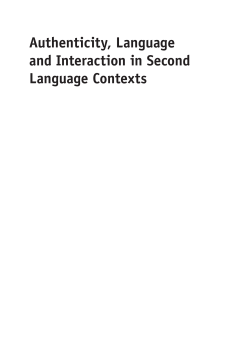
BOOK
Authenticity, Language and Interaction in Second Language Contexts
Rémi A. van Compernolle | Janice McGregor
(2016)
Additional Information
Book Details
Abstract
This collection addresses issues of authenticity in second language contexts from a variety of theoretical and methodological approaches along three principal themes: What is authentic language? Who is an authentic speaker? How is authenticity achieved? The volume responds to these questions by bringing together scholars working in a range of contexts, including with language learners in the classroom and in residence or study abroad, with a variety of second or additional languages: Chinese, English, French, German, Japanese and Spanish. Contributions focus on authenticity as it relates to patterns of language and meaning, and to agency, identity and culture, and serve as an opening to an extended conversation about the nature of authenticity and its development in L2 contexts. This volume is relevant for students and scholars interested in learning about or investigating questions of authenticity and interaction in a wide range of language learning contexts.
This excellent collection of studies offers new ways of understanding the multidimensionality of authenticity as it relates to language use, identity, agency and culture in a variety of second language learning contexts and from different theoretical and methodological approaches. Second language teachers and researchers of second language acquisition will find it an indispensable resource.
In bringing together a wealth of empirical data from both informal and formal pedagogic contexts, this collection not only makes a powerful and informed contribution to the still vibrant debate over the issue of authenticity in language education, but also succeeds in challenging and, to a large extent, superseding existing understandings of the concept.
Rémi A. van Compernolle is Assistant Professor of Second Language Acquisition and French & Francophone Studies at Carnegie Mellon University, USA. His research interests include sociocultural psychology, second language development, pedagogy and assessment, sociolinguistics, pragmatics and interactional competence. He is the author of Sociocultural Theory and L2 Instructional Pragmatics (2014, Multilingual Matters).
Janice McGregor is Assistant Professor of German at Kansas State University, USA. Her research interests include second language learning and use, study abroad and intercultural dimensions of language learning and use.
This excellent collection makes a significant contribution to emerging and increasingly diverse scholarship in Second Language Studies. Chapters probe and question key concepts and established assumptions in Pragmatics, Intercultural Communication and SLA. The book not only offers findings that deepen our understandings of what it means – in terms of theory and practice – to communicate in a superdiverse, multilingual world, it also effectively addresses the pressing question of how we should do Applied Linguistics in the 21st century.
Table of Contents
| Section Title | Page | Action | Price |
|---|---|---|---|
| Contents | v | ||
| Contributors | ix | ||
| 1 Introducing Authenticity, Language and Interaction in Second Language Contexts | 1 | ||
| 2 Evaluating L2 Pragmatic Appropriateness and Authenticity in Synchronous Computer-mediated Strategic Interaction Scenarios | 10 | ||
| 3 Authenticity and Pedagogical Grammar: A Concept-based Approach to Teaching French Auxiliary Verbs | 35 | ||
| 4 Sociolinguistic Authenticity and Classroom L2 Learners: Production, Perception and Metapragmatics | 61 | ||
| 5 Learning Speech Style in Japanese Study Abroad: Learners’ Knowledge of Normative Use and Actual Use | 82 | ||
| 6 Gender, Youth and Authenticity: Peer Mandarin Socialization Among American Students in a Chinese College Dorm | 109 | ||
| 7 Authenticating Language Choices: Out-of-Class Interactions in Study Abroad | 131 | ||
| 8 Authenticating Practices in Chinese Homestay Interactions | 151 | ||
| 9 Metapragmatic Talk and the Interactional Accomplishment of Authenticity in Study Abroad | 177 | ||
| 10 Focus on Form in the Wild | 198 | ||
| 11 Conclusions and Future Directions | 233 | ||
| Index | 242 |
